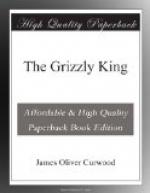The chief sat with his face to the fire, smoking silently, and Oachi came to Roscoe’s side, and touched hands timidly, like a little child. She seemed to him wondrously like a child when he lifted his head and looked down into her face. She smiled at him, questioning him, and he smiled his answer back, yet neither broke the silence with words. He heard only the soft little note in Oachi’s throat that filled him with such an exquisite sensation, and he wondered what music would be if it could find expression through a voice like hers.
“Oachi,” he asked softly, “why did you never sing?”
The girl looked at him in silence for a moment.
“We starve,” she said. She swept her hand toward the door of the tepee. “We starve—die—there is no song.”
He put his hand under her chin and lifted her face to him, as he might have done with a little child.
“I wish you would sing, Oachi,” he said.
For a moment the girl’s dark eyes glowed up at him. Then she drew back softly, and seated herself before the fire, with her back turned toward him, close beside her father. A strange quiet filled the tepee. Over their heads the wailing storm seemed to die for a moment; and then something rose in its place, so low and gentle at first that it seemed like a whisper, but growing in sweetness and volume until Roscoe Cummins sat erect, his eyes flashing, his hands clenched, looking at Oachi. The storm rose, and with it the song—a song that reached down into his soul, stirring him now with its gladness, now with a half savage pain; but always with a sweetness that engulfed for him all other things, until he was listening only to the voice. And then silence came again within the tepee. Over the mountain the wind burst more fiercely. The chief sat motionless. In Oachi’s hair the firelight glistened with a dull radiance. There was quiet, and yet Roscoe still heard the voice. He knew that he would always hear it, that it would never die.




